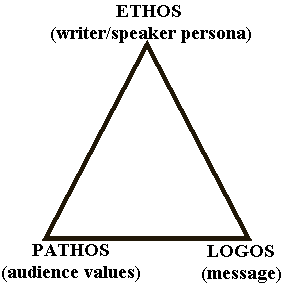Rhetoric: Difference between revisions
No edit summary |
No edit summary |
||
| (15 intermediate revisions by 2 users not shown) | |||
| Line 1: | Line 1: | ||
The art of speaking or writing persuasively or effectively. Any affective use of speach. | |||
The art of speaking | Rhetoric was prominently used in ancient education. Someone using Rhetoric would work to organize figures of speech, arrangement, and the delivery of what was being said. The [http://www.m-w.com/cgi-bin/dictionary?book=Dictionary&va=ROMANTICISM&x=11&y=17 Romantic] movement put an end to the importance placed on rhetoric, by pointing out that it was "shallow", and void of real meaning. When used in Greek, rhEtorikE, literally meant the art of oratory. Oratory means "the art of speaking in public eloquently or effectively" ("Oratory"). Someone who practiced, studied, or created rhetoric was known as a rhetorician. | ||
Aristotle writes that rhetoric is "an ability, in each <nowiki>[particular]</nowiki> case, to see the available means of persuasion" (36). In rhetoric, there are three "species" [[ethos]], [[pathos]], and [[logos]] (Aristotle 37). Rhetoric is used in any form of public address. Often it is used to describe politics, as Aristotle states "thus too, rhetoric dresses itself up in the form of politics" (39). | |||
[[Image:Rhettriangle.gif|frame|thumbnail|50px|Image courtesy of Felicia Steele|center]]. | |||
==Works Cited== | |||
*Aristotle. ''A Theory of Civic Discourse On Rhetoric''. New York: Oxford University Press, 1991. | |||
*Baldick, Chris. ''The Concise Oxford Dictionary of Literary Terms''. New York: Oxford University Press, 1990. | |||
*Steele , Felicia. "[http://steele.intrasun.tcnj.edu/spring2002/rhet2/rhetreview.html Rhetoric and Argument: A Review]." The College of New Jersey. 2/20/06. | |||
*Harmon, William. A Handbook to literature Ninth Edition. New Jersey: Prentice Hall, 2002. | |||
[[Category:Literary Terms]] | |||
Latest revision as of 20:54, 23 February 2006
The art of speaking or writing persuasively or effectively. Any affective use of speach.
Rhetoric was prominently used in ancient education. Someone using Rhetoric would work to organize figures of speech, arrangement, and the delivery of what was being said. The Romantic movement put an end to the importance placed on rhetoric, by pointing out that it was "shallow", and void of real meaning. When used in Greek, rhEtorikE, literally meant the art of oratory. Oratory means "the art of speaking in public eloquently or effectively" ("Oratory"). Someone who practiced, studied, or created rhetoric was known as a rhetorician.
Aristotle writes that rhetoric is "an ability, in each [particular] case, to see the available means of persuasion" (36). In rhetoric, there are three "species" ethos, pathos, and logos (Aristotle 37). Rhetoric is used in any form of public address. Often it is used to describe politics, as Aristotle states "thus too, rhetoric dresses itself up in the form of politics" (39).
.
Works Cited
- Aristotle. A Theory of Civic Discourse On Rhetoric. New York: Oxford University Press, 1991.
- Baldick, Chris. The Concise Oxford Dictionary of Literary Terms. New York: Oxford University Press, 1990.
- Steele , Felicia. "Rhetoric and Argument: A Review." The College of New Jersey. 2/20/06.
- Harmon, William. A Handbook to literature Ninth Edition. New Jersey: Prentice Hall, 2002.
